Google-Intel Chrome OS event

In San Francisco, Google and Intel kick off a special event for Chrome OS, which I assert is come of age with the matchup. Ahead of the 1 pm Eastern start time, Lenovo announced new Chromebooks and Google unveiled "Classroom", preview of a new education app.
Unquestionably, Chrome OS-devices are primed for the education market, and many of the newest Chromebooks are directly marketed for schools, students, or teachers. Dell jumped ahead of today's event touting Chromebook 11 adoption in schools.
Chrome OS comes of age
Today's Google-Intel event is a turning point for Chrome OS. The matchup is more magnanimous than Apple shipping the first x86 Macs eight years ago. Intel is after all the other half of Wintel, and the company's coming out for Chrome OS endorses the browser-based operating system as mainstream -- as do a rash of new Chromebooks announced or released over the past month by Acer, Dell, Lenovo, and Samsung.
Chrome OS has huge momentum in the education market, for example. There are news stories about school conversions nearly every week. Those are sales taken away from Apple or Microsoft platforms. Success is shocking, because every new operating system directly competing with Windows has failed since release of version 3.1 two decades ago. The Microsoft monopoly is insurmountable, or was until Google's entrance.
Dell Chromebook 11 review
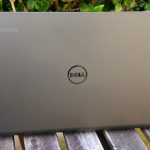
Chromebook represents a philosophical change -- a quiet revolution -- in personal computing, where relevance moves from hardware and software to electrical service-like cloud utility. In this brave new world, Chromebook is an appliance meeting most desktop needs, and pricing is closer to microwave ovens than to traditional PCs.
Nowhere is there more receptiveness to adaptation, or willingness to lead technological revolution, than the education market. There is historical precedent and fortunate timing: Chromebook fits neatly. Cost is low, utility is high, and familiarity is great. What is more natural to Millennial students than the web browser? They are accustomed to breathing the cloud's rarefied air and enjoying the benefits of anytime, anywhere computing -- freedom to float. Dell Chromebook 11 is primed for educational use while, unlike Lenovo's model, being easily purchased by anyone. This review addresses the computer's suitability for students, teachers, or you.
Apple's ad campaign really is 'powerful'
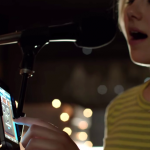
I can't seem to escape Apple's "Powerful" commercial, which during some primetime programs airs two, or even three, times. The TV spot is aspirational marketing done right, with booming tagline: "You're more powerful than you think".
Apple's response to new smartphones like HTC One M8 or Samsung Galaxy S5 isn't something new but more aggressive advertising highlighting iPhone 5s benefits. The campaign, particularly the main commercial, is emotive and empowering. The message is simple: You can achieve your dreams when using the Apple handset. While Android competitors focus on features, like larger displays and quad-core processors, Apple singles out benefits -- what you tangibly get by using iPhone 5s and a dozen different apps the ad campaign highlights.
Apple makes MacBook Air less appealing
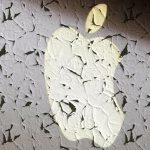
The significance of today's MacBook Air refresh: What is and what isn't. I focus specifically on the smaller model. What is: Slight processor refresh, but lower entry price -- $899 for the masses and $849 for education, both 100 bucks less than yesterday. What isn't: Retina Display screen resolution.
From the perspective of physical size, screen dimension (11.6-inches), resolution (1366 x 768), Intel processor, and core benefits, the lower pricing brings MacBook Air closer to Chromebook, particularly for school purchasers. Both computers compete for educational buyers, and Dell, HP, Lenovo, and Samsung all target the market with compelling Chromebooks. As differences diminish and price gaps lessen, the Apple becomes less appealing by comparison. Stated another way: New pricing shines fresh spotlight on MBA, which similarities to lower-cost Chromebooks are greater for school year 2014-15.
Tim Cook pulls off a Steve Jobs

I meant to write this yesterday, but day late is better than never. Listening to Apple's fiscal second quarter 2014 earnings conference call on Wednesday, I was awed by how cleverly and aggressively CEO Tim Cook stated growth metrics for iPad and iPhone. My immediate reaction: "What is he hiding?" Wall Street beat down Apple shares following release of great Q1 results three months ago. From the stated stats to announced 7-to-1 stock split, seems to me like Cook intended to aggressively and proactively manage perceptions -- and he did. He was unusually free sharing sales and growth data, which is uncharacteristic of Apple but typical of perception management tactics.
Company cofounder Steve Jobs was a master marketer. Cook isn't in the same league of inspiring people to believe that "One More Thing" aspires greater happiness. But Cook lived up to his name -- cooking the numbers -- in Jobs-like sleight of hand. Look here people, instead of over there, and witness magic rather than the trick. But behind the veil, iPad and iPhone don't look as great as he presented them. One thing you learn, if working as a journalist long enough: When to recognize misdirection or deception.
Samsung Chromebook 2 is delayed
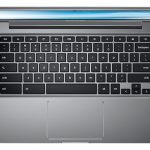
Sorry, but I can't tell you why yet. I have this statement from Samsung PR about 13.3-inch Chromebook 2, in response to my inquiry: "The product is now shipping at the end of May". That puts the computer in the channel a month later than planned. I have asked for a reason but don't expect to get one.
Samsung unveiled Chromebook 2 in March, in 11.6- and 13.3-inch configurations. The company started taking preorders more than two weeks ago, offering a free case to anyone purchasing before April 27. I ordered one on April 8 from Amazon with delivery date of April 29, which put expected launch a day earlier. But then on April 10, Amazon emailed that my new delivery date would be May 2 and the website indicated availability on the 1st. Last week, Amazon changed the date to May 15 and by the beginning of this week to May 29. Around the same time, Samsung stopped taking preorders of this model and the 11.6-inch white. The manufacturer still accepts preorders on the black, smaller Chromebook, for which Amazon lists May 7 release.
Microsoft Q3 2014 by the numbers: $20.4B revenue, 68 cents EPS
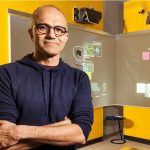
Today, after the closing bell, Microsoft disclosed results for fiscal third quarter, during most of which freshly-minted CEO Satya Nadella captained the ship. Of course, he carries a course set for him by predecessor Steve Ballmer, and his real impact is really quarters away. But there's a fresh presence behind the wheel and a new hat hanging in the captain's cabin. That's reason enough for Wall Street to forgive any storms the good ship Microsoft sales -- eh, sails.
For the three months ended March 31, Microsoft reports $20.4 billion revenue, flat year over year. Operating income: $6.97 billion. Net income: $5.66 billion, or 68 cents a share. All figures are GAAP.
Apple Q2 2014 by the numbers: $45.6B revenue, $11.62 EPS

The Apple of Wall Street's eye takes little bruising today, with announcement of fiscal second quarter results. During three months when concerns about falling revenues and profits was constant rumbling, the fruit-logo company defies the worst naysayers.
For fiscal Q2, Apple reports $45.6 billion revenue and net profit of $10.2 billion, or $11.62 a share. Gross margin: 39.3 percent. International sales accounted for 66 percent of revenues. A year earlier, the company reported revenue of $43.6 billion and $9.5 billion net quarterly profit, or $10.06 per share. Gross margin was 37.5 percent.
Honestly, Microsoft, what are you doing?
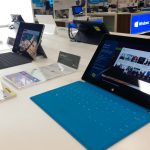
Microsoft announces fiscal third quarter earnings on Thursday -- reason for me to visit the site today in preparation. I saw what you see in the photo. Tagline: "Honestly, my new PC is exactly what I need at half the price I thought I'd pay". I find the company's months-old "Honestly" campaign to be refreshing in overall presentation and emphasized benefits. Value is big among them. (Colleague Wayne Williams disagrees, by the way.)
Honestly, what's missing: More promotion how great a value Surface is. The Windows RT model doesn't get loads of respect, but I increasingly think that it should. Surface 2 offers HD display, like the Pro model, setting the tablet apart from comparably-sized Androids or iPads selling for about the same price: $449, with 32GB of storage. Microsoft Store offers the refurbished original, granted with lower screen resolution, for $199. Bump memory to 64GB and pay $219. Keyboard cover is another $74.01. Honestly, wow.
Amazon Kindle Fire HDX 8.9 is just right [Review]
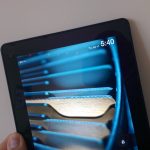
If Goldilocks visited the bears' home and tried tablets instead of porridge and beds, Google Nexus 7 would be too small. Samsung Galaxy Tab Pro 12.1 would be too big. But Amazon Kindle Fire HDX 8.9 would be just right. This tweener tab is optimal size, packs bright breathtaking display, and is easily used for many hours with minimal eye, hand, or arm strain. While screen size and design concepts are little changed from the previous model, the HDX is thinner, lighter, higher-resolution, and well-matched to a bizarre-looking but beneficial case cover.
Kindle Fire HDX 8.9 is a nearly perfect Android tablet -- that is for anyone buying into the Amazon lifestyle. If I were asked to recommend any tab, the HDX would be one, and iPad Air the other. Both share similar usability benefits and tightly-integrated content and commerce stores, supporting services, and appealing apps. In late November, I put both tablets on my list of favorite products for 2013.
Acer C720P Chromebook puts brawn before beauty [review]
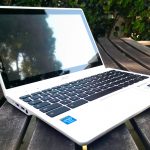
I struggle to aptly describe my feelings about Acer's affordable touchscreen Chromebook. The C720P is the lover you keep in the dark, for the benefits, but which you wouldn't be seen with in the daylight. Performance and battery life are wow-worthy. But the plastic exterior looks and feels cheap, and the touchscreen is too dim -- well, for my tastes.
More than two months now using the C720P, I like the computer least of all the Chromebooks to pass my way. I really want to love the laptop, and maybe you will. Perhaps experience using other Chromebooks soils my perception, and I am too quick to compare. That's why I sought, and got, reaction from C720P owners, many of which are more forgiving about appearances for performance benefits. Their responses are essential to this review.
Google Camera goads iPhone

Android phones running stock or manufacturer-installed KitKat 4.4+ get a big photo-shooting upgrade today. Google Camera is now available from the Play store. The app replaces the standard shooter on Nexus devices and places a separate camera app on others. The headline feature: Lens Blur, which does exactly what the name indicates. You shoot the image, and then use the app to either blur the foreground or background. Photographers call the capability "bokeh", and it usually requires a specialized lens on dedicated hardware to produce well. The blurred effect is highly desirable for portraits. Can you say selfie?
Google does what Apple should -- use software development wits to add hardware smarts. This is exactly the kind of thing I would expect from the fruit-logo company first. But that's a number recently missing from the iOS crop. Google is by no means first to offer software blur, but in my testing delivers arguably the best effort. Hell, the new camera app even shames newfangled hardware mechanisms. HTC One M8 uses two lenses and feature UFocus to produce bokeh. In my testing, on The One and Nexus 7, blur is surprisingly comparable.
You can have Apple iPhone 5s, I'll take HTC One M8
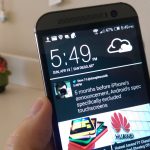
Many new smartphone shoppers will compare the HTC One M8 and Samsung Galaxy S5, which are about the same size, offer similar high-end features, run Android (with customized user interfaces), and arrived in U.S. retail stores within days of one another. But since I move from iPhone 5s to what henceforth will be referred to as The One, the two devices are uniquely attractive, and both pack bleeding-edge cameras, my comparison is more Apple to oranges. If iPhone 5s is high up your shopping list don't buy without first considering The One. It's my choice, although granted it might not be best for you.
I moved from the original One, the M7, to the 5s a few months ago. You might laugh at the reason. I find that my daughter, who shuns Androids for Apples, is more likely to text message when we both use iPhones. She is away at college. But the 5s, like iPhone 5, immediately disappointed for phone calling. Reception tends to breakup in my neighborhood on both devices, using AT&T or T-Mobile. Calling is superior and adequate on either One, and even better on the Moto X. The One illuminates the Apple's inadequacies, which simply are unacceptable coming from the company that popularized touchscreen smartphones.
Amazon buys comiXology
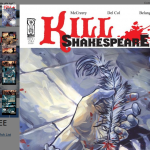
Jeff Bezos expands his digital-publishing empire, by acquiring one of the electronic comic-book pioneers. I get more PR emails from comiXology than most any other company. Not as much as Google or Microsoft, but close. That is until recently. Now I understand why, assuming silence is golden before the big merger announcement.
Amazon expects to close the acquisition during second quarter, giving the company a big footprint in the digital comic-book market. Founded in 2007, comiXology helped bring Marvel and DC Comics to digital. Rough -- and very inexact industry estimates -- put paid digital comic downloads at 40 million per year.
Joe's Bio
Joe Wilcox is BetaNews executive editor. His motto: Change the rules. Joe is a former CNET News staff writer, JupiterResearch senior analyst, and Ziff Davis Enterprise Microsoft Watch editor.
Ethics StatementBetaNews, your source for breaking tech news, reviews, and in-depth reporting since 1998.
© 1998-2025 BetaNews, Inc. All Rights Reserved. About Us - Privacy Policy - Cookie Policy - Sitemap.
